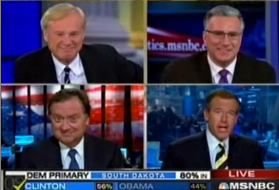It’s still all about the white men. Hillary Clinton’s loss has renewed critiques that American political media is slanted, sexist and dominated by men. While Clinton and Obama broke barriers in the Democratic primary, swiftly dispatching white male Senators with more government experience, the race was still refereed, scored and narrated by white male commentators, an influential constituency in presidential politics. Pundits talked a lot about gender and racial progress during the campaign, of course, but the elite opinion media continues to employ, groom and promote a commentators corps that is disproportionately white and male.
The most traditional location to reach the political establishment, the Washington Post opinion section, is brazenly male-dominated. Seventeen of the 19 columnists are men; only three of the columnists are racial minorities. Guest op-eds could present more voices, but they rarely do. This year, only 12 percent of the Post’s guest pieces came from women, according to a May count by ombudsman Deborah Howell. At the New York Times, eight of the ten weekly columnists are men; one is black. (The Times also recently created a bimonthly graphics column, a post filled by a black commentator.) And in an industry review last year, about one out of four columnists were women at the largest syndicates around the country, according to Editor and Publisher. As Times columnist Nick Kristoff lamented last month, even as reporting staffs diversify, white men dominate American punditry "from newspaper columnists to television talking heads."
The disparity is striking on air. Most anchors, producers and writers in television news are women, according to the Radio and Television News Directors Association,  yet the vast majority of prime time hosts, who dominate campaign coverage and frame presidential debates, are white men. That includes all the Sunday morning hosts, all the prime time hosts on MSNBC, and all but one of the prime time hosts on CNN and FOX.
yet the vast majority of prime time hosts, who dominate campaign coverage and frame presidential debates, are white men. That includes all the Sunday morning hosts, all the prime time hosts on MSNBC, and all but one of the prime time hosts on CNN and FOX.
The Democratic primary did briefly boost the diversity of the pundit pool – all those segments about race and gender would have been eerie with the usual lineup. "Both MSNBC and CNN this election season have given new prominence to a handful of contributing commentators from varied backgrounds and perspectives: blacks, Hispanics and women," the Times reported in April. "Whether such moves signal real progress in diversifying the punditocracy or merely reflect the needs of a particular news cycle is the question." And while the networks obviously should not bench diverse commentators until "diversity" is in the news, the booking history for political shows is not encouraging.
Popular
"swipe left below to view more authors"Swipe →According to a recent, two-year study of the four major Sunday talk shows by Media Matters, out of over 2,000 guests, 77 percent were men and 82 percent were white. The top rated show, "Meet the Press," also led the pack in male representation, at an embarrassing 85 percent. Latinos were almost completely absent, comprising one percent of the guests. Latinos make up about 14 percent of the population, and the study ran through 2006 and 2007, when immigration policy was often in the news.
Many women and minority commentators must also battle ideological discrimination. All four Sunday shows booked more conservative pundits than liberals in 2006, according to a Media Matters study. On ABC’s "This Week," for example, conservative pundits dominated by 36 percent to 19 percent. So liberal guests end up competing for fewer spots. Black commentators are already underrepresented. And then, since most black commentators lean left, their booking odds plummet further. (Only seven percent of black Americans self-identify as Republicans, according to Pew.)
In fact, a 2005 Urban League study of the Sunday shows found that a staggering 69 percent of all the appearances by black guests were made by just three conservatives — Condoleezza Rice, Colin Powell, and Juan Williams. The study found that appearances by black commentators "other than Rice, Powell and Williams account for less than 3% of all guest appearances on the Sunday morning talk shows." And out of over 600 bookings during the same 18-month period, you could count the invitations for black women on half your hand. After Rice, only two other black women appeared: PBS’ Gwen Ifel and Democratic strategist Donna Brazille.
The commentariat’s gender and racial disparities are perennially documented and criticized, of course. Susan Estrich, a writer and ubiquitous political pundit in her own right, sparked the last debate in 2005, after blasting the testosterone coursing through the op-ed section at the Los Angeles Times. Fred Hiatt, the Washington Post’s editorial page editor, jumped in the fray by declaring, "there ought to be more women on op-ed pages in general. Over time, I intend to make that happen." (Apparently he did not have a three-year window in mind.) The Nation‘s Katha Pollitt has constructively published lists of female writers who would make great columnists (or pundits), just to help out any media search committees. Next month, minority bloggers are gathering at the "Blogging While Brown" conference to network the burgeoning black blogosphere – a new and largely neglected talent pool of opinionated commentators for print and television debates. And some writers say even Clinton’s loss could spur gender progress. Anna Holmes, a self-described "woman of color" who blogs at Jezebel.com, recently penned a Times op-ed urging Hillary Clinton to give a major, post-campaign address about "sexism in American life." That speech could contrast the public’s demonstrated support for women in actual politics – from her strong showing to the rising number of women in Congress – with the exclusion of so many women and minorities from political media. And readers, like voters, can continue to press for a political system and public discourse that actually represents the public.


